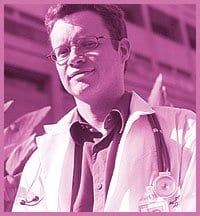We know about the prejudice often shown gay patients seeking sympathetic health care, but what’s it like on the other side of the lab coat?
If the person holding the stethoscope is gay, chances are good that he or she has been the subject of discrimination sometime in their career.
But that’s changing, according to Dr Ken Haller, soon to be president of the Gay And Lesbian Medical Association. The group holds its 20th annual conference in Toronto next week. With some 2,000 members, about 60 of them Canadian, the GLMA wants to tackle the issue of discrimination within health care.
“If you act like it’s something to be ashamed of, they’re going to assume it’s something shameful,” says Haller, assistant professor of pediatrics at St Louis University’s medical school. “Those of us who work in large centres are usually working in tolerant situations, but physicians and health workers from rural areas don’t have the same experience.”
Many of the conference sessions directly address homophobic workplaces, including one by Patrick Smith, vice president of clinical programs at Toronto’s Centre For Addiction And Mental Health (CAMH). Smith will speak on the responsibility of gay men and women in positions of leadership to be “drivers of norms, models of behaviour that all can look to.”
Smith tells of a Pride Day flag raising at CAMH where he spotted an employee peering out from behind some bushes, “almost as if just being there could out him.”
Smith’s remarks at the ceremony emphasized that the centre was behind “not just getting our own house in order, but becoming a leader in diversity.” A few days later, Smith saw the same employee in an elevator – this time wearing freedom rings around his neck.
Smith points out that he’s not the only openly-wgay leader at CAMH. The other is Dr Peter Coleridge, vice president of communications, education and community health. Coleridge is also in an out relationship with Smith – a sure sign of strong change for the better in the medical profession. But Smith says that his workplace is a long way from perfect.
“There’s a hell of a lot of work to do. We’ve had clear examples of homophobia, and our most marginalized clients, like transgendered [people] have had a hard time accessing services. We have a long way to go. We’re not even halfway yet.”
Dr Chris McIntosh, a representative of conference host SOGLAD (Southern Ontario Gay And Lesbian Association Of Doctors), has had his own experiences of homophobia. Now in his second year of residency at Mount Sinai in Toronto, McIntosh has sometimes hidden his sexuality from his employers.
“Certain doctors have [homophobic] views, and they’re in a position of power above you, so what do you do?” He tells of a female friend who had to face harassment both as a woman and a lesbian. “She eventually got the residency she sought, but had to really force the issue.”
Dr Phillip Berger, chief of the family and community medicine department at Toronto’s St Michael’s hospital, is a straight physician who has been dealing with gay patients and issues for more than 25 years. He’ll be challenging conference attendees to take up what he calls the physician’s duty to “engage in political action which would support the well-being of their patients.” Berger is concerned that physicians, both gay and straight, aren’t working hard enough to see the underlying conditions that bring gay patients to their offices.
“Political, economic and social conditions all contribute to symptoms. Teens who face bigotry, hate mongering and prejudice when they come out are well known to face higher levels of mental anguish, pain and sometimes death.”
For example, there’s human pappilomavirus (HPV) and its links to rectal cancer. Both Haller and Berger agree that if a person is in the high risk profile – someone who engages in unprotected anal receptive intercourse – should get a regular anal pap smear. Berger notes that Toronto General Hospital is starting to offer this service, but is concerned about the quality of test results.
“Does the lab know how to read the test, does the pathologist know how to interpret it? Doctors should be willing to say ‘We don’t know’ and set about finding out, instead of pretending they have the answers. That’s the value of conferences such as this one,” says Berger.
* The GMLA physician referral service that helps find queer or queer-positive physicians is available at www.glma.org. Local referrals are on the SOGLAD website at www.web.net/~soglad.

 Why you can trust Xtra
Why you can trust Xtra


